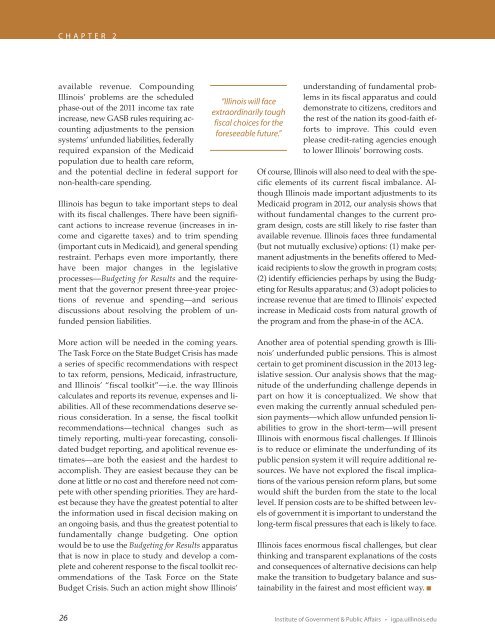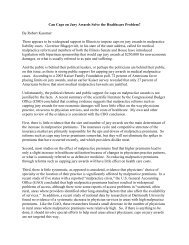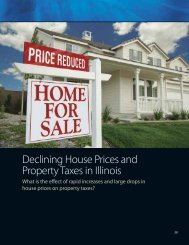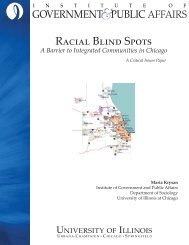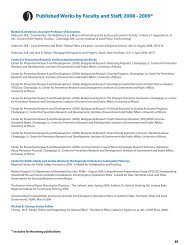The Illinois Report 2013 - Institute of Government & Public Affairs ...
The Illinois Report 2013 - Institute of Government & Public Affairs ...
The Illinois Report 2013 - Institute of Government & Public Affairs ...
You also want an ePaper? Increase the reach of your titles
YUMPU automatically turns print PDFs into web optimized ePapers that Google loves.
C H A P T E R 2<br />
available revenue. Com pound ing<br />
<strong>Illinois</strong>’ problems are the scheduled<br />
phase-out <strong>of</strong> the 2011 income tax rate<br />
increase, new GASB rules requiring accounting<br />
adjustments to the pension<br />
systems’ unfunded liabilities, federally<br />
required expansion <strong>of</strong> the Medicaid<br />
population due to health care reform,<br />
and the potential decline in federal support for<br />
non-health-care spending.<br />
<strong>Illinois</strong> has begun to take important steps to deal<br />
with its fiscal challenges. <strong>The</strong>re have been significant<br />
actions to increase revenue (increases in income<br />
and cigarette taxes) and to trim spending<br />
(important cuts in Medicaid), and general spending<br />
restraint. Perhaps even more importantly, there<br />
have been major changes in the legislative<br />
processes—Budgeting for Results and the requirement<br />
that the governor present three-year projections<br />
<strong>of</strong> revenue and spending—and serious<br />
discussions about resolving the problem <strong>of</strong> unfunded<br />
pension liabilities.<br />
“<strong>Illinois</strong> will face<br />
extraordinarily tough<br />
fiscal choices for the<br />
foreseeable future.”<br />
understanding <strong>of</strong> fundamental problems<br />
in its fiscal apparatus and could<br />
demonstrate to citizens, creditors and<br />
the rest <strong>of</strong> the nation its good-faith efforts<br />
to improve. This could even<br />
please credit-rating agencies enough<br />
to lower <strong>Illinois</strong>’ borrowing costs.<br />
Of course, <strong>Illinois</strong> will also need to deal with the specific<br />
elements <strong>of</strong> its current fiscal imbalance. Although<br />
<strong>Illinois</strong> made important adjustments to its<br />
Medicaid program in 2012, our analysis shows that<br />
without fundamental changes to the current program<br />
design, costs are still likely to rise faster than<br />
available revenue. <strong>Illinois</strong> faces three fundamental<br />
(but not mutually exclusive) options: (1) make permanent<br />
adjustments in the benefits <strong>of</strong>fered to Medicaid<br />
recipients to slow the growth in program costs;<br />
(2) identify efficiencies perhaps by using the Budgeting<br />
for Results apparatus; and (3) adopt policies to<br />
increase revenue that are timed to <strong>Illinois</strong>’ expected<br />
increase in Medicaid costs from natural growth <strong>of</strong><br />
the program and from the phase-in <strong>of</strong> the ACA.<br />
More action will be needed in the coming years.<br />
<strong>The</strong> Task Force on the State Budget Crisis has made<br />
a series <strong>of</strong> specific recommendations with respect<br />
to tax reform, pensions, Medicaid, infrastructure,<br />
and <strong>Illinois</strong>’ “fiscal toolkit”—i.e. the way <strong>Illinois</strong><br />
calculates and reports its revenue, expenses and liabilities.<br />
All <strong>of</strong> these recommendations deserve serious<br />
consideration. In a sense, the fiscal toolkit<br />
recommendations—technical changes such as<br />
timely reporting, multi-year forecasting, consolidated<br />
budget reporting, and apolitical revenue estimates—are<br />
both the easiest and the hardest to<br />
accomplish. <strong>The</strong>y are easiest because they can be<br />
done at little or no cost and therefore need not compete<br />
with other spending priorities. <strong>The</strong>y are hardest<br />
because they have the greatest potential to alter<br />
the information used in fiscal decision making on<br />
an ongoing basis, and thus the greatest potential to<br />
fundamentally change budgeting. One option<br />
would be to use the Budgeting for Results apparatus<br />
that is now in place to study and develop a complete<br />
and coherent response to the fiscal toolkit recommendations<br />
<strong>of</strong> the Task Force on the State<br />
Budget Crisis. Such an action might show <strong>Illinois</strong>’<br />
Another area <strong>of</strong> potential spending growth is <strong>Illinois</strong>’<br />
underfunded public pensions. This is almost<br />
certain to get prominent discussion in the <strong>2013</strong> legislative<br />
session. Our analysis shows that the magnitude<br />
<strong>of</strong> the underfunding challenge depends in<br />
part on how it is conceptualized. We show that<br />
even making the currently annual scheduled pension<br />
payments—which allow unfunded pension liabilities<br />
to grow in the short-term—will present<br />
<strong>Illinois</strong> with enormous fiscal challenges. If <strong>Illinois</strong><br />
is to reduce or eliminate the underfunding <strong>of</strong> its<br />
public pension system it will require additional resources.<br />
We have not explored the fiscal implications<br />
<strong>of</strong> the various pension reform plans, but some<br />
would shift the burden from the state to the local<br />
level. If pension costs are to be shifted between levels<br />
<strong>of</strong> government it is important to understand the<br />
long-term fiscal pressures that each is likely to face.<br />
<strong>Illinois</strong> faces enormous fiscal challenges, but clear<br />
thinking and transparent explanations <strong>of</strong> the costs<br />
and consequences <strong>of</strong> alternative decisions can help<br />
make the transition to budgetary balance and sustainability<br />
in the fairest and most efficient way. ■<br />
26<br />
<strong>Institute</strong> <strong>of</strong> <strong>Government</strong> & <strong>Public</strong> <strong>Affairs</strong> • igpa.uillinois.edu


